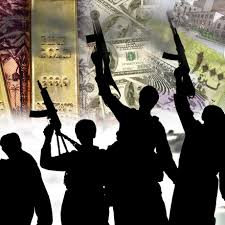Terrorism – Philosophy Notes – For W.B.C.S. Examination.
সন্ত্রাসবাদ – দর্শন শাস্ত্রের ণোট – WBCS পরীক্ষা।
Definitions Of Terrorism
Definitions of terrorism are usually complex and controversial, and, because of the inherent ferocity and violence of terrorism, the term in its popular usage has developed an intense stigma. It was first coined in the 1790s to refer to the terror used during the French Revolution by the revolutionaries against their opponents. The Jacobin party of Maximilien Robespierre carried out a Reign of Terror involving mass executions by the guillotine. Although terrorism in this usage implies an act of violence by a state against its domestic enemies, since the 20th century the term has been applied most frequently to violence aimed, either directly or indirectly, at governments in an effort to influence policy or topple an existing regime.Terrorism is not legally defined in all jurisdictions; the statutes that do exist, however, generally share some common elements. Terrorism involves the use or threat of violence and seeks to create fear, not just within the direct victims but among a wide audience. The degree to which it relies on fear distinguishes terrorism from both conventional and guerrilla warfare. Although conventional military forces invariably engage in psychological warfare against the enemy, their principal means of victory is strength of arms. Similarly, guerrilla forces, which often rely on acts of terror and other forms of propaganda, aim at military victory and occasionally succeed (e.g., the Viet Cong in Vietnam and the Khmer Rouge in Cambodia). Terrorism proper is thus the systematic use of violence to generate fear, and thereby to achieve political goals, when direct military victory is not possible. This has led some social scientists to refer to guerrilla warfare as the “weapon of the weak” and terrorism as the “weapon of the weakest.”
Types Of Terrorism
Various attempts have been made to distinguish among types of terrorist activities. It is vital to bear in mind, however, that there are many kinds of terrorist movements, and no single theory can cover them all. Not only are the aims, members, beliefs, and resources of groups engaged in terrorism extremely diverse, but so are the political contexts of their campaigns. One popular typology identifies three broad classes of terrorism: revolutionary, subrevolutionary, and establishment terrorism. Although this typology has been criticized as inexhaustive, it provides a useful framework for understanding and evaluating terrorist activities.Revolutionary terrorism is arguably the most common form. Practitioners of this type of terrorism seek the complete abolition of a political system and its replacement with new structures. Modern instances of such activity include campaigns by the Italian Red Brigades, the German Red Army Faction (Baader-Meinhof Gang), the Basque separatist group ETA, and the Peruvian Shining Path (Sendero Luminoso), each of which attempted to topple a national regime. Subrevolutionary terrorism is rather less common. It is used not to overthrow an existing regime but to modify the existing sociopolitical structure. Since this modification is often accomplished through the threat of deposing the existing regime, subrevolutionary groups are somewhat more difficult to identify. An example can be seen in the ANC and its campaign to end apartheid in South Africa.Establishment terrorism, often called state or state-sponsored terrorism, is employed by governments—or more often by factions within governments—against that government’s citizens, against factions within the government, or against foreign governments or groups. This type of terrorism is very common but difficult to identify, mainly because the state’s support is always clandestine. The Soviet Union and its allies allegedly engaged in widespread support of international terrorism during the Cold War; in the 1980s the United States supported rebel groups in Africa that allegedly engaged in acts of terrorism, such as the National Union for the Total Independence of Angola (UNITA); and various Muslim countries (e.g., Iran and Syria) purportedly provided logistical and financial aid to Islamic revolutionary groups engaged in campaigns against Israel, the United States, and some Muslim countries in the late 20th and early 21st centuries.
Please subscribe here to get all future updates on this post/page/category/website


 +919674493673
+919674493673  mailus@wbcsmadeeasy.in
mailus@wbcsmadeeasy.in







































































































